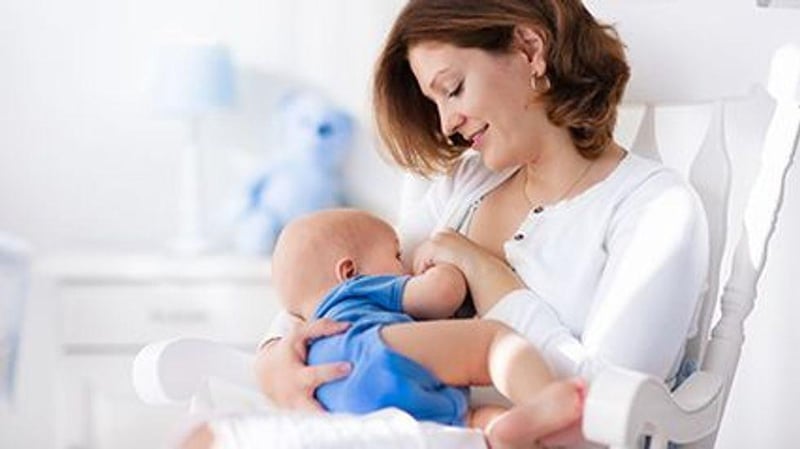Recursos del Paciente
Manténgase sano!
Breastfeeding by Moms Who've Had COVID May Help Protect Newborn
- November 4, 2021
- Amy Norton HealthDay Reporter

Moms who had COVID-19 when they gave birth may help stimulate their infant's burgeoning immunity against the virus by breastfeeding, a small study hints.
It's well known that breast milk contains certain maternal antibodies that can help protect infants from infections as their own immune systems develop.
Studies indicate that's true of SARS-CoV-2, as well: Breast milk from moms who had COVID-19, or have been vaccinated against it, contains antibodies against the virus.
Antibodies passed from mom to baby -- both in the womb and via breastfeeding -- offer what's called "passive" immune protection, where a mother's antibodies stand guard while the baby's immune system develops.
Now the new study suggests that breastfeeding after COVID-19 may also help spur a more "active" immune response in babies: It found that by the age of 2 months, breastfed infants' saliva contained certain antibodies directed at the SARS-CoV-2 "spike" protein.
"We have shown for the first time that the mother can also trigger the active immune response of the newborn through the transfer of antigen-antibody immune-complexes," said senior researcher Dr. Rita Carsetti, of Bambino Gesù Children's Hospital in Rome, Italy.
Those "complexes," she explained, are maternal antibodies with the spike protein bound to them.
The findings do not show whether those antibodies in saliva offer infants extra protection against getting sick should they encounter SARS-CoV-2.
It's possible they could help defend against virus that got into a baby's eyes or nose, said Dr. Tina Tan. She is a professor of pediatrics at Northwestern University in Chicago, and spokeswoman for the Infectious Diseases Society of America.
But, Tan said, the best way to transfer protective antibodies to babies is by getting vaccinated during pregnancy: Those antibodies cross the placenta and into the fetal blood.
In this study, most infants had no antibodies directed at SARS-CoV-2 in their blood.
At the beginning of the pandemic, no one knew if it was possible for mothers with COVID-19 to pass the virus to their babies via breast milk. Subsequent research showed that was not the case, and guidelines encourage mothers who have COVID-19 to continue breastfeeding (or start if they just gave birth) -- though with precautions like mask-wearing.
The current study -- published online Nov. 3 in JAMA Network Open -- included 22 newborns born to mothers who tested positive for SARS-CoV-2 at delivery. Only one infant tested positive for the infection right after birth; one more later tested positive days later.
Carsetti's team found that at 2 months of age, infants who were breastfed showed antibodies against the spike protein in their saliva. That was not true of babies who were exclusively formula-fed.
When the researchers tested moms' breast milk samples, they found that all harbored those key complexes -- antibodies with spike protein bound to them. Levels were particularly high two days after delivery; they'd declined by the two-month mark.
The study is important because it's the first demonstration that breastfeeding can "actively stimulate" an infant's immune system to make salivary antibodies against SARS-CoV-2, said Dr. Lori Feldman-Winter.
Feldman-Winter, a professor of pediatrics at Cooper Medical School of Rowan University in Camden, N.J., chairs the American Academy of Pediatrics' section on breastfeeding.
"Human milk is known to participate in programming the infant's immune system during the first few days of life," she said. "Therefore, mothers' milk following COVID infection activated their infants' immune system to produce COVID-specific salivary antibodies, whereas formula feeding infants did not produce this response."
Carsetti said research is ongoing, both to confirm the current findings and to see whether infants born to vaccinated moms also show signs that their immune systems have been actively stimulated against the virus.
Like Tan, she pointed out that when pregnant women get vaccinated, their antibodies are passed through the placenta.
More information
The American College of Obstetricians and Gynecologists has more on COVID-19, pregnancy and breastfeeding.
SOURCES: Rita Carsetti, MD, Diagnostic Immunology Clinical Unit, Bambino Gesù Children's Hospital, Rome, Italy; Tina Tan, MD, professor, pediatrics, Northwestern University Feinberg School of Medicine, Chicago, and spokeswoman, Infectious Diseases Society of America, Arlington, Va.; Lori Feldman-Winter, MD, MPH, professor, pediatrics, Cooper Medical School of Rowan University, Camden, N.J.; JAMA Network Open, Nov. 3, 2021, online

